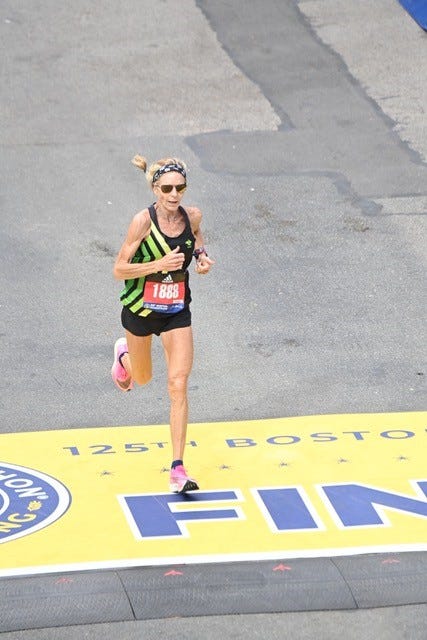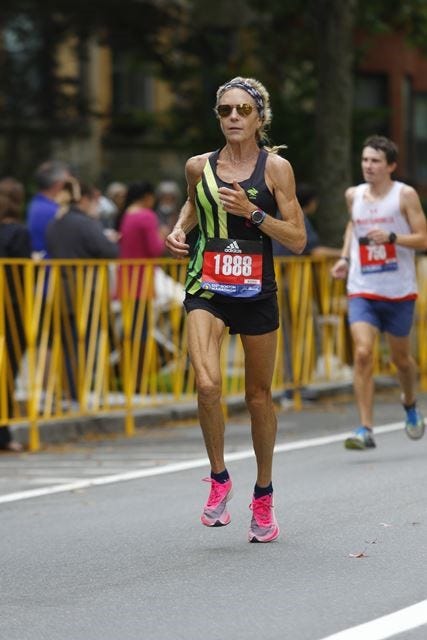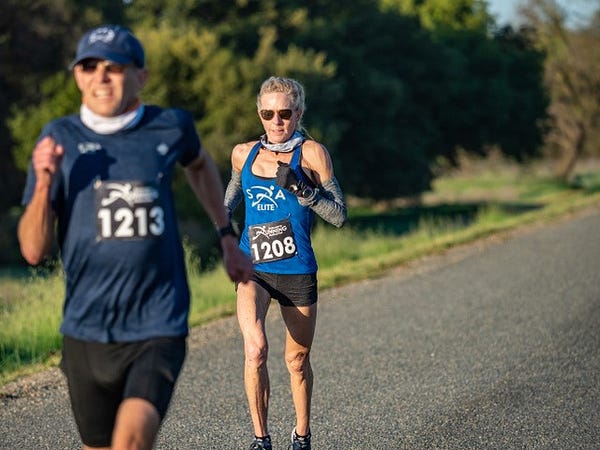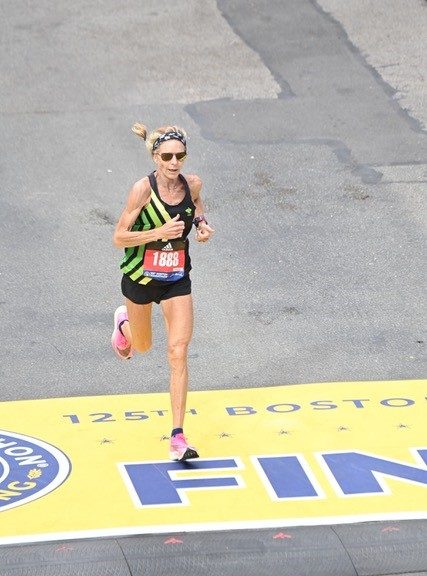Boston 2021 was the fastest marathon in her career so far

Whether you are a runner or not, there is a magic marathon revered and appreciated by many: Boston.
With the Boston marathon taking place on April 18th, 2022, let’s hear some wise advice from Jenny Hitchings, who lives in Sacramento, CA with her husband, Andy, and their dog, Mia. Hitchings is the world marathon record holder in the 55 to 59 age group.
“And now at 58, I am still getting faster and still running PRs. My time at the Boston Marathon on October 11th, 2021 of 2:45:32 was a lifetime PR. This is where people ask, how? I wish I had an easy answer that I could deliver in a box with a bow. But I don’t.” — Jenny Hitchings in an interview for Run in Rabbit blog
A five-time Age Group (55–59) American Record holder in various race distances and an Age Group World Record holder in the marathon, Hitchings is also a running coach for individuals, youth, and middle school cross-country. Besides her exciting running and coaching career, Hitching has two grown girls, Molly and Maggie, and is a newly crowned grandma to Olivia (Molly’s baby).
Hitchings’ advice on training and running a strong Boston marathon
- Doing harder workouts within her long runs with her fast runner friends and teammates from SRA Elite team has helped her be well-prepared for Boston. Some of Hitching’s favorite workouts were: long runs with fast finishes to practice picking up the pace even though legs are feeling tired, progression runs where the pace starts slower and gets faster with every mile, as well as running GMP (goal marathon pace) tempos and longer GMP mile intervals, such as 3x 2, 2 x 3, 2 x 4.
2. Running many 20-mile runs, or longer. Occasionally, Hitchings tried to run on courses that mimicked the Boston course hills by starting on a slight 3-mile downhill and returning on the same hill around mile 16 to simulate the challenging Boston course. She also advises running on rolling hills to strengthen the quadricep muscles that need to help you transition in downhill and uphill running, which can also be done on trails.
3. Do NOT go out too fast, as Boston starts with downhill running. “If starting too fast or beyond what you know is reasonable, your legs will fatigue and cramp by Newton hills and beyond. Try and run effort based on the inclines, and let it flow on the declines,” advised Hitching.
4. And last, but not least, enjoy the crowds! Smile, pump your fists, and hands in the air, as spectators will scream and cheer louder, which can carry you a long way.

Improving running and athletic longevity
“I have been running since college (for fitness) and more competitively since I was 40, so I don’t have all the wear and tear on my legs like if I had been running at a high level in high school and college,” said Hitchings. “I have a flexible schedule that allows me to run when I want. I have a coach. I train hard, and I have good genes,” she added.
Hitchings’ advice to women runners of all ages, but particularly women over 50 regarding running the best races of their lives:
- The first and most important thing is to love running because it makes it easier to be consistent and do what it takes to get out the door, instead of making excuses about why you can’t run or train.
- Success has nothing to do about comparing yourself to others, and everything to do with being the best you can be at any given point in your life.
- As far as reducing injuries and increasing your running longevity, Hitchings can’t say that she has stayed injury-free over the years. She had an Achilles/heel surgery and a PRP (Platelet Rich Plasma injections) procedure on her glute/upper hamstring. Hitchings added that running with no pain felt enlightening! Although she admits to not being great at doing strength or cross-training — Hitchings does enjoy riding outside or on her Peloton — she regularly sees her sports chiropractor doctor and gets deep tissue massage. She also thinks that walking her dog 1.5–2 miles after runs helps her stretch and feel loose.
- Hitchings pointed out that getting good or better at running (or anything) takes time: practice pacing, fueling, hydrating, running on different courses and terrain, and adding mileage. “In the end, your training doesn’t lie,” she said.
- Sometimes, Hitchings watches dogs run and thinks, “they have it right. They just do it organically. Warm up with a trot, run fast and chase things to get the energy out, slow down because they’re tired, find a stick and chew on it in the shade, because, why not? Then get up and repeat. Interval training at its best without getting injured.”

Although Hitchings is not running the Boston Marathon this year, she hopes to see her granddaughter Olivia at her next Boston, wearing a T-shirt that says:
“My nana is FAST as AF.”
Meanwhile, happy tapering for Boston, and don’t forget to wave at the crowds!
For more inspiration on how to let “AIR,” which stands for adaptation, inspiration, and resilience guide, please consider buying my print edition or e-book The PR- The Poetics of Running, A Book of Poetry in Motion and Morsels of Love, A Book of Poetry and Short Forms on Amazon, or buy it straight from my blog by clicking on my books link, which will take you to Amazon.
For more info on running and real estate, whether buying or selling, please e-mail me at carmenmicsa@yahoo.com, or call me at 916-342-2446. Also mention this blog and receive a great offer whether buying (credit for closing costs) or selling (commission discount). Running for real estate with joy!

